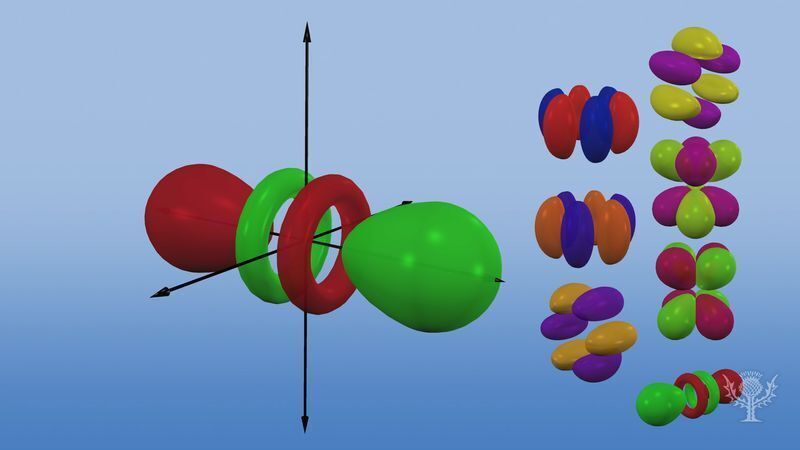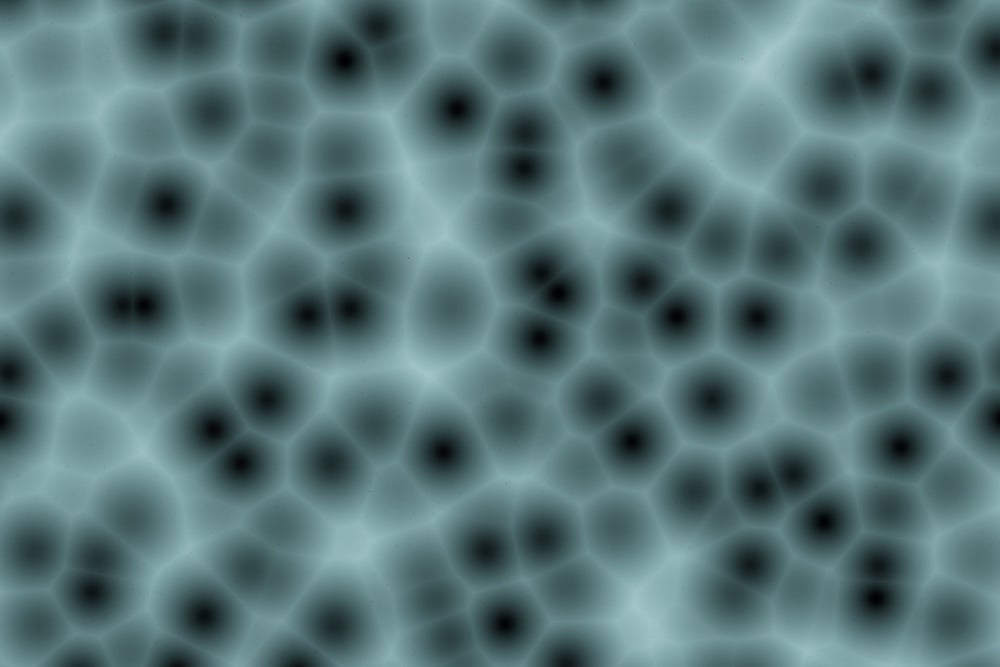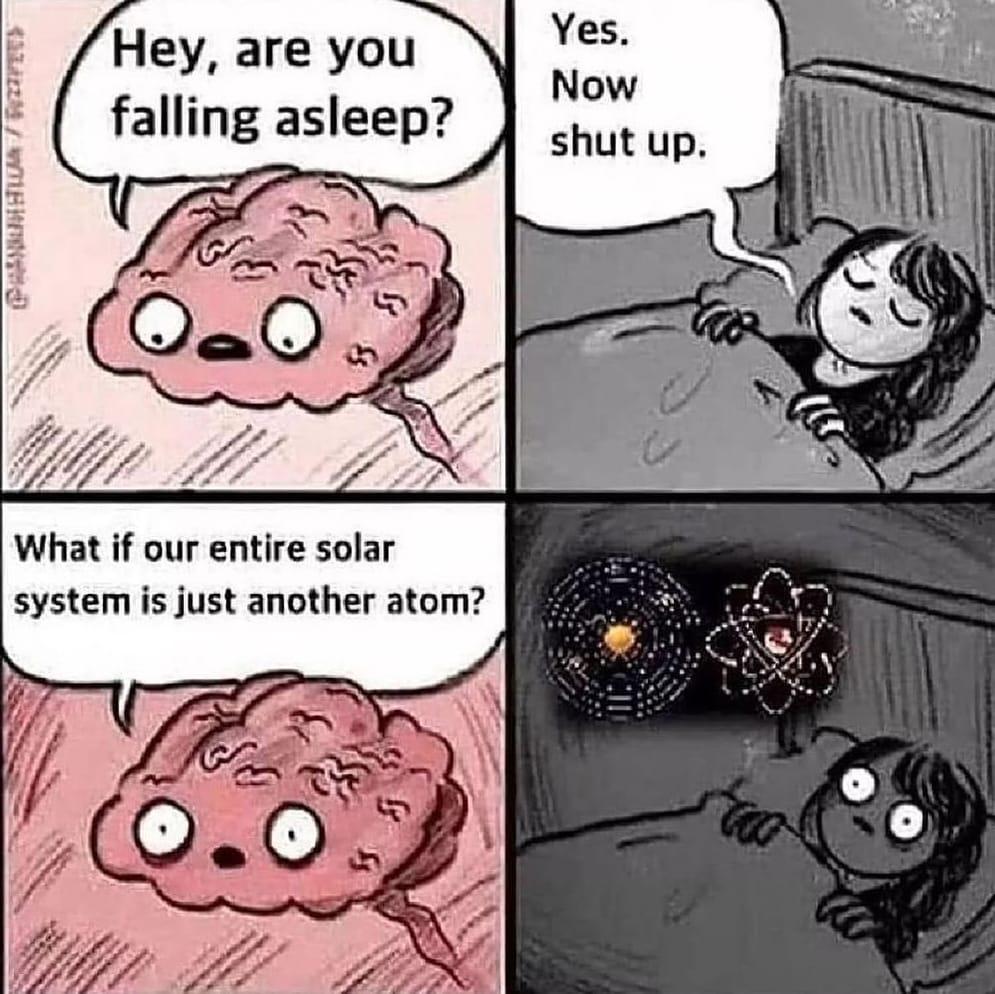The atom model with the electrons going around the nucleus, is inspired by the solar system. The better model doesn't look anything alike. This is a naturalistic circular fallacy
Science Memes
Welcome to c/science_memes @ Mander.xyz!
A place for majestic STEMLORD peacocking, as well as memes about the realities of working in a lab.

Rules
- Don't throw mud. Behave like an intellectual and remember the human.
- Keep it rooted (on topic).
- No spam.
- Infographics welcome, get schooled.
This is a science community. We use the Dawkins definition of meme.
Research Committee
Other Mander Communities
Science and Research
Biology and Life Sciences
- !abiogenesis@mander.xyz
- !animal-behavior@mander.xyz
- !anthropology@mander.xyz
- !arachnology@mander.xyz
- !balconygardening@slrpnk.net
- !biodiversity@mander.xyz
- !biology@mander.xyz
- !biophysics@mander.xyz
- !botany@mander.xyz
- !ecology@mander.xyz
- !entomology@mander.xyz
- !fermentation@mander.xyz
- !herpetology@mander.xyz
- !houseplants@mander.xyz
- !medicine@mander.xyz
- !microscopy@mander.xyz
- !mycology@mander.xyz
- !nudibranchs@mander.xyz
- !nutrition@mander.xyz
- !palaeoecology@mander.xyz
- !palaeontology@mander.xyz
- !photosynthesis@mander.xyz
- !plantid@mander.xyz
- !plants@mander.xyz
- !reptiles and amphibians@mander.xyz
Physical Sciences
- !astronomy@mander.xyz
- !chemistry@mander.xyz
- !earthscience@mander.xyz
- !geography@mander.xyz
- !geospatial@mander.xyz
- !nuclear@mander.xyz
- !physics@mander.xyz
- !quantum-computing@mander.xyz
- !spectroscopy@mander.xyz
Humanities and Social Sciences
Practical and Applied Sciences
- !exercise-and sports-science@mander.xyz
- !gardening@mander.xyz
- !self sufficiency@mander.xyz
- !soilscience@slrpnk.net
- !terrariums@mander.xyz
- !timelapse@mander.xyz
Memes
Miscellaneous
If atoms were like the solar system, all of the electron orbits would lose energy and decay by emitting electromagnetic radiation.
The same type of decay does occur in the solar system as the planets emit gravitational radiation, but the decay rate is so miniscule we can't really detect it.
Could you explain what you mean by "emitting gravitational radiation"? Gravity is how we perceive distortions in spacetime, the strength of which being determined by the mass of the objects. I understand that orbits can "decay", but that is not the same as radioactive decay.
General relativity is famously difficult to understand, and I don't claim to fully understand it, so I'm going to fall back to the famous rubber sheet model.
Imagine the Earth in empty space. The mass of the Earth causes spacetime curvature that extends outward away from the Earth. However, if you look a single little patch of spacetime at some distance, say, 1000 km away, that little patch doesn't know that it has to be curved because the Earth is 1000 km away. It doesn't know where the Earth is. It just knows that its neighboring patch is a little bit more curved in the direction that leads to Earth, and its other neighbor is a little bit less curved going away from Earth. This essentially restates the principle of locality: all physics is local physics, and there is no spooky action at a distance.
Now imagine that the Earth moves by some small distance dx in a small time dt. Going back to our little patch of spacetime, it doesn't know that the Earth moved. So how does it change its curvature to match the new position of the Earth? It changes when its neighbors change. When the Earth moves, the spacetime immediately near the Earth stretches and bends first, then spacetime a little further away, and so on and so on. This process doesn't happen instantaneously; it takes time for changes to propagate to longer distances. The theory predicts that disturbances and ripples will propagate via waves, called gravitational waves, and that these waves travel at the same speed of light as electromagnetic waves.
Notice I called these spacetime waves "gravitational waves." It is common to use the term "gravity waves" for typical water waves, of the kind you might see at the beach. Those are not the same type of wave.
Now let's talk about energy. The Earth in the solar system has some energy, including translational and rotational kinetic energy, gravitational potential energy as it sits in the Sun's gravity well, and of course its own thermal energy and rest mass. Waves have the ability to transport energy from one location to another without transporting matter, mass, or electric charge. Spacetime waves are not any different. Because the Earth is moving in a periodic motion, it produces a periodic spacetime wave that propagates outward away from the solar system, and that spacetime wave carries some amount of energy away from the solar system. Where does that energy come from? It comes from the Earth, mainly from the Earth's kinetic energy.
So the story is that the gravitational waves are very, very, very slightly causing the Earth to slow down in its orbit. And following the laws of orbital mechanics, this causes the Earth to fall closer to the Sun. The result is that over the long term, the radius of the Earth's orbit gets smaller. Alternatively, the Earth's circular orbit is an illusion, and it's actually spiraling inward on a very, very, tightly packed spiral. That's what I meant by "orbital decay."
I find it hard to overstate just how small this gravitational radiation effect is for a typical solar system situation. We have an observatory called LIGO that can detect gravitational waves. It can measure a variation in distance of a tunnel of several kilometers down to well less than a single proton diameter. (Remember, this is trying to detect disturbances in space and time itself). Even still, it is only able to detect gravitational waves from the most powerful kinds of gravitational events--mergers of black holes and the like.
Essentially: Spacetime is very "stiff" and gravity is very weak.
They weren't talking about radioactive decay, electrons are stable. They were talking about electrically charged particles emitting electromagnetic radiation when accelerated. (Circular movement is accelerated, see centripetal force) Since they use energy for this, they would very quickly fall into the nucleus (if I remember correctly, in around 10^-14 s).
Bodies with mass also emit gravitational waves when accelerated, but much less.
Electrons do orbit like planets in the solar system however they're also waves. Which is what gives the set radii they can orbit at and keeps it all stable. The orbits can and do change due to the emission or absorption of certain quanta of radiation.
So saying like is fine. It's not an exact description but more of a simile to help understanding. They do orbit like a solar system. Saying electrons orbit the same as a solar system would be incorrect. That's when the maths doesn't work and the electrons orbit would decay.
that is not what i've learned, afaik electrons do not orbit with any sort of movement, and in fact talking about positions and movements at all on such a small scale is misleading.
What i've learned is that electrons exist as a probability cloud, with a certain chance to observe them in any given position around the atom depending on the orbital and the amount of other electrons.
Comparing it to gravitational orbits is just basically entirely incorrect, and certainly isn't going to help someone pass advanced physics classes.
Yes, because everybody knows the earth is in the sun's p orbital

What if our solar system is just another balloon animal???
Nono, these are d orbitals. Although p orbitals are equally silly.
I stand corrected. I should have checked; I mean, I'm not a quantum astrophysicist.
Honestly the visual representation of the atom is just a simplified artist's rendition. It's more acceptable to treat the atom's components as charge fields filled with very high energy contained by nuclear forces. That said, the planets with molten cores and the sun also have their own electromagnetic fields so maybe the concept isn't so far off.
It would be fun to see the planets zipping around in random locations in their orbit. And if you kick one hard enough, it pops over to another orbit and emits a huge ass photon when it pops back.
There was a guy on the net years ago who claimed that the entire universe is an electron on a plutonium atom. He made a religion out of it, wrote hymns to the atom (or, more precisely, changed the words of Christian hymns, clumsily fitting in references to plutonium atoms) and even legally changed his name to Archimedes Plutonium.
That sounds like something out of a fallout fanfiction
Look, I'm not saying our universe exists as a node in an infinite fractal of repeating universes, but one of these is the largest structure we can see and another is the smallest:


God doesn't play dice but he sure does repeat the same tune. I believe this same pattern is observable in our brains when neurons fire is it not?
There's probably some math which explains the consistency of the pattern.
Or that the observable universe could be inside of a black hole. Don't watch too many black hole videos before bed.
Planet 9 is not a primordial black hole and it can't hurt you. 🙀
From my understanding of primordial black holes, if one were so close as to be in our solar system, it is very small.
Since it's so small, it would have fizzled out through hawking radiation output a long time ago.
So yes, planet 9 is NOT a black hole that can hurt you.
Now, a pocket of warped spacetime that will one day spawn a Chaos Demon? Maybe.
It still fucks with me that we went from 9 planets to 8, pour one out for Pluto
I thought I heard once that our universe could be a holographic projection on a 2D plane surrounding around a black hole.
Don't ask me for any details further than that, because I do not remember.
There was an episode of PBS Space Time on the holographic principle in general recently, and I believe they've also discussed the black hole thing as well.
If it's a block hole, it doesn't really matter. A black hole is not more dangerous than a planet with the same mass, it has the same gravity. The only difference is that it's much tinier. If planet 9 is a black hole, it's so small that Sun has stronger gravity (and bigger mass), meaning it's bound to rotate around the Sun the same way every other large body in the Solar system is.
Planet 9 maybe is or isn't a primordial black hole and it won't hurt you.
I've always liked this idea. Like, everything just repeats as infinitum whether you look smaller and smaller or bigger and bigger. The universe is just one of those fractal image kaleidoscopes.
I mean when I'm on Delta-8 that's how I see the world, sometimes on shrooms too. Everything is just zooming out and zooming in, and it's all just.... the same thing, but not the same time... and all of it is turning to face God, but they only see the others turning to face God, infinitely everything looking for the source, but we can only see the other universes looking for God....
It'a... circular, I think it's going somewhere but it doesn't.
The galaxy is in Orion's belt.
"well brain, it seems you really need this sleep because that makes no sense whatsoever"
Considering how much shit orbits the sun that would be one wildly unstable atom
Nah. Sun just acts as the Queen Atom. Without it, you’d end up with a Helvetica Scenario. This is basic science.
everything written in a terrible font?
Oh. wrong Helvetica.
#commicsansforlife😁
Please, jokes about this subject are very difficult for people affected by these situations. That is, it's not the time to bring up comic sans, ok?
Me too
I had this thought as a kid. But I thought it was neat that we might be part of an atom of some larger molecule. Didn't keep me awake. I had other trauma keeping me awake, like going to school.
Now imagine if something... or someone... would poke our galaxy with an observation, and all the stars in the arms instantly collapsed into a single particle.
There are better manners to avoid the sleep

